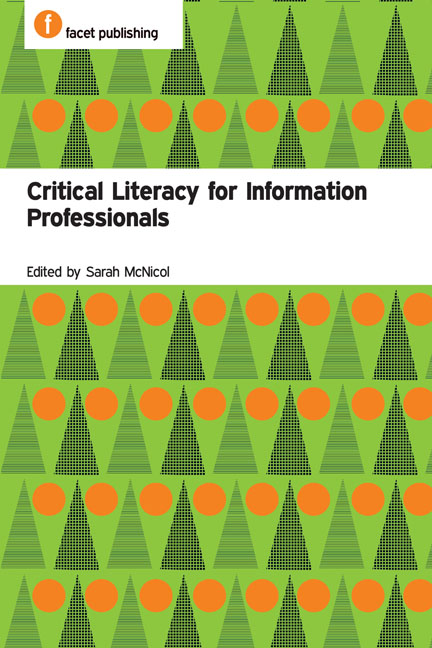Book contents
- Frontmatter
- Contents
- Contributors
- Introduction
- PART 1 THEORIES OF CRITICAL LITERACY
- 1 Renegotiating the place of fiction in libraries through critical literacy
- 2 Death of the author(ity): repositioning students as constructors of meaning in information literacy instruction
- 3 Reading health-education comics critically: challenging power relationships
- 4 Reframing librarians’ approaches to international students’ information literacy through the lens of New Literacy Studies
- 5 Using new literacies to discuss disability in the library
- 6 ‘Anyone can cook’: critical literacy in the workplace
- 7 Social justice, adult learning and critical literacy
- PART 2 CRITICAL LITERACY IN PRACTICE
- Further information
- Index
6 - ‘Anyone can cook’: critical literacy in the workplace
from PART 1 - THEORIES OF CRITICAL LITERACY
Published online by Cambridge University Press: 08 June 2018
- Frontmatter
- Contents
- Contributors
- Introduction
- PART 1 THEORIES OF CRITICAL LITERACY
- 1 Renegotiating the place of fiction in libraries through critical literacy
- 2 Death of the author(ity): repositioning students as constructors of meaning in information literacy instruction
- 3 Reading health-education comics critically: challenging power relationships
- 4 Reframing librarians’ approaches to international students’ information literacy through the lens of New Literacy Studies
- 5 Using new literacies to discuss disability in the library
- 6 ‘Anyone can cook’: critical literacy in the workplace
- 7 Social justice, adult learning and critical literacy
- PART 2 CRITICAL LITERACY IN PRACTICE
- Further information
- Index
Summary
Introduction
Carr and Kemmis (1986) bemoan the existence of a pervasive ‘theory–practice gap’ in the education profession. Principles, standards and other generalized insights which emerge from the research literature are valuable only in so far as they must be interpreted and then applied in the practice of teachers on the ground, whether in schools, universities, workplaces or the informal learning networks which permeate society. Carr and Kemmis observe, however, that this view of the profession – with practice continually transformed through reflection on that practice – is increasingly subservient to one where practitioners have practice dictated to them by interests (management, consultants, academic researchers) who are essentially external to the profession. In this chapter, I argue that this view of education needs to be extended beyond just formal education as practised in schools and colleges, and into workplace education, the sector in which many information professionals reside. Exploring the meaning of critical literacy in the workplace setting is the narrative device through which this argument is supported.
As with all critical theory, in order to have force, critical literacy cannot be a set of theoretical principles which somehow stand above the social settings in which they are practised. Furthermore, it cannot be defined as a set of preexisting judgements about practice. To be truly critical, critical literacy must, instead, be developed in practice, emerging from the collective judgements that are made in real learning settings and the dialogues that are constantly emerging from these settings (Linell, 2009).
This chapter is concerned with critical literacy in a specific setting – the workplace. In line with the above-mentioned principles, I do not intend to define or conceptualize critical literacy in advance. Rather, in this chapter I will explore how it emerges from the work of two key authors who have studied workplaces as dynamic and social settings for learning: Annemaree Lloyd and Etienne Wenger. For both, ‘literacy’ – though Wenger tends more often to use the term ‘competence’ – is negotiated by practitioners. It is therefore an intrinsically collective, intersubjective phenomenon, and one that is specific to particular contexts. The critical dimension emerges when one considers the role of authority in these social settings, and how authority can direct learning, and possibly retard or nullify it.
- Type
- Chapter
- Information
- Critical Literacy for Information Professionals , pp. 65 - 78Publisher: FacetPrint publication year: 2016



